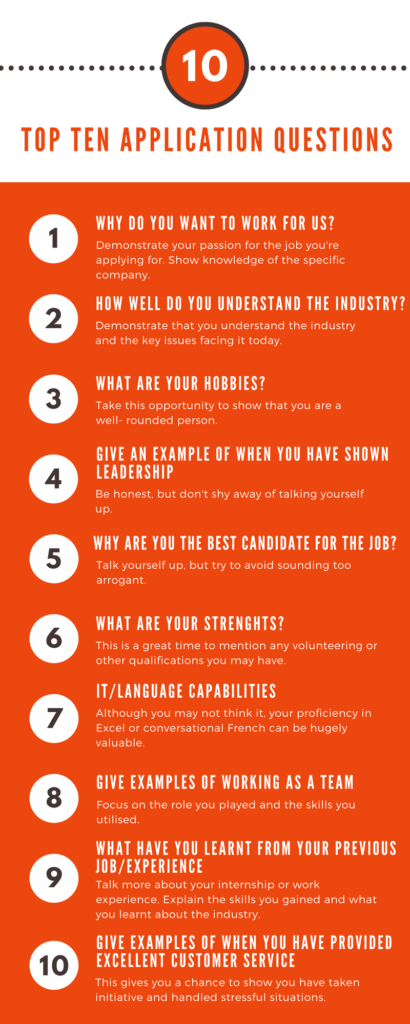Applying for graduate jobs can be a daunting task, and the graduate job market is fiercer than ever. Last year, the country’s top employers received 10% more graduate job applications than the equivalent period in 2016-2017, so you could well be applying to quite a few jobs before you hit the jackpot.
This can be a very time consuming process, especially as many companies these days aren’t happy with just a CV and cover letter, but they also want you to fill out an application form too.
The good news is that, while the phrasing may vary, the questions employers ask aren’t all that different. From our research of 166 companies, we found that the same questions crop up in 90% of the application forms. We also found that the standard word limit was 250 words, so as long as you can answer the top ten application questions in less than a tweet, you’ll be a-okay.
So what are these top ten application questions? We take a look at the most common application questions, and how to answer them.
1. Why do you want to work for us?
This is one of the most common application questions, and for good reason. It may seem obvious, but you need to demonstrate your passion for the job you’re applying for. You need to show your knowledge of the specific company and its wider position within the industry.
Backup any statements that you make: if you know you would enjoy working there, why? What specific features of the company appeal to you? For example, does the idea of a small-to-medium accountancy firm appeal to you? Or perhaps you’ve heard good things about the company culture at the actuarial firm you are applying to?
Prove that you are focused and enthusiastic about the company and the role you are going for, it’s what employers want to see.
2. How well do you understand the industry/job?
These can be tricky questions because they are open-ended. However, this is where your prior research comes in.
When talking about the industry, the interviewer wants to see that you understand the industry you want to work in, and how the company fits in to this picture. For example, if you dream of becoming an accountant, read up on some industry publications, such as Accountancy Age, to research the events that are having an impact upon the industry. Our guide to the Accountancy Profession also has plenty of information on the profession and the different areas of work.
When asked about how well you know the job, you will talk about what you understand the role to be and the responsibilities you will be taking on should you get the job. Here is a good time to draw on personal experiences and how these make you qualified for the role. However, avoid simply listing your qualifications; you need to explain them in a practical context.
3. What are your hobbies?
More than half of all application forms featured this question, so you should take it as seriously as the others.
Companies want to see that you are a well-rounded person. Some companies even offer a separate application form for applicants who may have achieved lower grades but excelled in their extra-curricular activities.
Highlight any leadership roles here, but don’t worry if you weren’t President of your University Maths society, plenty of interests can demonstrate your positive qualities. For example, playing on a football team can show you are committed, while going travelling shows you are highly organised, interested in new cultures and love taking on new challenges.
4. What positions of responsibility have you held/Give an example of when you have shown leadership
This is the perfect question for those who were on their student council, treasurer of a society or even President.
However, we know that this will not be the case for many applicants, but there’s no need to panic. You simply have to be more imaginative. Did you take charge on a group project? Or perhaps you were captain of your sports team, or even supervisor at your Saturday job. Be honest , but don’t shy away from talking yourself up, show that you can be a leader.
5. Why are you the best candidate for the job?
Here, you will talk yourself up, but you will need to do so without being arrogant. This is a delicate balance that, if you master, you will perfect your application.
Instead of phrases such as ‘I’m highly intelligent’, say ‘I enjoy intellectual challenges, for example…’. Always back up your statements with evidence and tailor your answers to the specific job requirements.
6. What are your strengths/achievements/additional qualifications?
This is the time to mention any volunteering or other achievements you may want to mention.
While these are not relevant to the working world, make sure that you refer back to how these achievements will help you in a work environment. For example, volunteering shows commitment. Working towards alternative qualifications, such as becoming a first aider or a sports coach, shows that you are motivated.
7. IT and language capabilities
The opportunity to list your IT and language capabilities may come up at different points through the application. Don’t assume that, because you don’t have an IT degree or are fluent in a second language that your skills aren’t of interest. If you have conversational French or similar, put that down.
Often, companies are interested in your capacity to learn languages rather than which languages you can speak.
With IT skills, you could be surprised at how valuable your Word, Excel and Powerpoint skills are.
However, it is important to be realistic. If you over-exaggerate your skills here, it could come back to haunt you when you are asked to translate in a meeting with a French client.
8. Give examples of working as a team/problem solving abilities
This question differs from question four, so you will need to draw on new experiences and qualities for this answer, should you be asked both.
Explain the situation, the problem and how you overcame it, emphasising on the role you played and the skills you utilised.
Try not to repeat yourself, it is important to be as succinct as possible, rather than trying to fill space.
9. What have you learnt from previous jobs/work experience?
Ideally, you will have completed an internship or work experience in the field you are applying for. If you have, then use this question to bring out specific skills you acquired and responsibilities you had.
Talk about what you learnt on the job, what you discovered about the industry and what interested you the most.
If you haven’t completed any specific work experience, then there is no need to panic. Use this question to talk about other experience that you might have from being in the workplace. If you are applying for a job in finance, then talking about taking stock takes at work and the skills you used can be just as valuable.
10.Give examples of when you have provided excellent customer service
This question is a chance for you to show that you have taken initiative and handled stressful situations well.
Answers to this question do not have to be sensational or particularly elaborate, but simply talking about a time you dealt with a difficult customer at your part-time job will suffice. It shows that you can communicate well.
So those are the top ten application questions you may be asked. Having great answers pre-prepared should come in handy in practically all of your applications. However, you will need to tailor each answer to the specific application you are applying for, do not simply cut & paste your answers.
Always take note of the specific wording. Are you being asked for just the one example or multiple examples? Is there a word limit?
With application forms, employers want to see your ability to interpret instructions and deliver exactly what is required.
Be specific, be succinct and be positive. Good luck!






